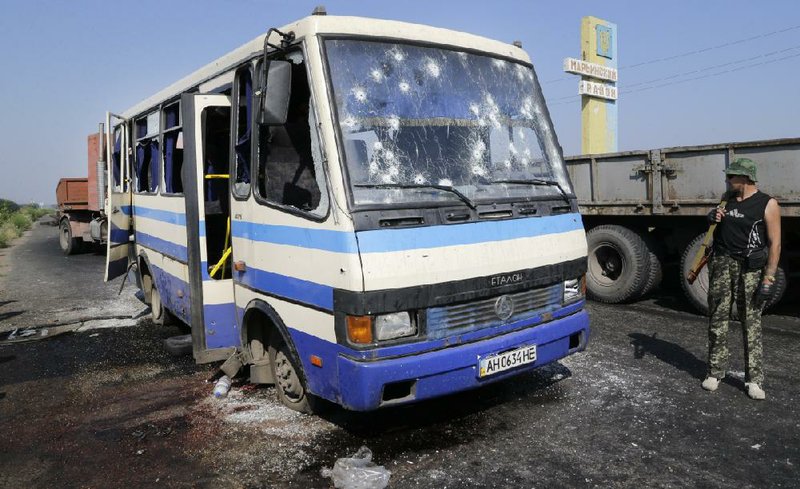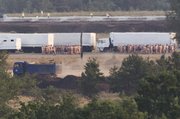DONETSK, Ukraine -- As a standoff ensued between Russia and Ukraine over an aid convoy dispatched from Moscow, a rebel-held city in eastern Ukraine came under intensified shelling, and the United Nations revealed that the death toll from the fighting between government troops and separatists has nearly doubled in the past two weeks.
A spokesman for the U.N.'s human-rights office, Cecile Pouilly, said the organization's "very conservative estimates" show that the overall death toll has risen to at least 2,086 as of Sunday, up from 1,129 on July 26.
Pouilly said at least 4,953 others have been wounded in the fighting since mid-April.
While the humanitarian crisis reaches a critical stage in at least one major Ukrainian city, a convoy of trucks apparently carrying some 2,000 tons of aid has sat idle at a military depot in Russia.
Moscow insists that it coordinated the dispatch of the goods -- which include baby food, canned meat, portable generators and sleeping bags -- with the international Red Cross, but Ukraine said it's worried that the mission is a cover for an invasion.
A spokesman for local authorities in the main rebel-controlled city of Donetsk said Wednesday that rocket attacks over the previous night had increased in intensity.
Several high-rise apartment blocks in a southwestern district in the city showed the effect of artillery strikes. The local government said three people were killed, a figure that adds to the sharply mounting death toll.
Shelling in Donetsk has damaged power plants and gas pipelines, leaving large parts of the city without electricity or gas, city council spokesman Maxim Rovinsky said.
Damage to residential buildings is an apparent result of two combined factors: The army has refrained from going into Donetsk, favoring an artillery campaign over close urban combat. And local residents have regularly revealed that damaged houses are often to be found near rebel firing positions, suggesting that the rocket attacks are responses to outgoing strikes.
Government troops and the volunteers fighting with them are also seeing heavy losses while making regular territorial advances.
At least 12 militiamen fighting alongside the army were killed overnight Tuesday in an ambush outside Donetsk, a spokesman for their radical nationalist movement said Wednesday.
The situation in Luhansk, also in rebel hands, is yet more serious. City authorities said Wednesday that many of the more than 200,000 people living there have gone without power for 11 days. Running water also has dried up, and the few working shops are selling only basic essentials.
Rocket attacks remain a daily occurrence.
The scale of the crisis there prompted Moscow to send a convoy of white trucks Tuesday carrying aid for the population in the Luhansk region. Ukraine grudgingly agreed to the initiative while expressing misgivings over Russia's failure to coordinate with the International Committee of the Red Cross.
Andre Loersch, a spokesman for the Red Cross mission in Ukraine, said he was still in the dark Wednesday about the final destination of the convoy.
Other than what appeared to be a few supply runs, the roughly 262 vehicles in the convoy sat idle at a military base in the southern city of Voronezh into Wednesday evening.
Under a tentative agreement, Ukraine and Russia had said the aid would be delivered to a government-controlled crossing in Ukraine's Kharkiv region, which hasn't been touched by the months of fighting that have wracked neighboring regions. The cargo would then have to be inspected by the Red Cross.
Russia and Ukraine have said they were expecting the Red Cross to handle the logistics of the delivery, but officials from the group said the two governments had to agree first on the inspection of the goods and their transfer -- if indeed they are transferred -- to other vehicles for transport to Luhansk.
"The Russians and the Ukrainians have not agreed on the first step," said Pascal Cuttat, the head of the Red Cross delegation in Moscow. Once the aid material is inspected and cleared for entry into Ukraine, the Red Cross could take responsibility for it, he said.
That could take time, depending on whether the inspection involves X-rays or hand inspections. An agreement has to be reached on questions like whether every bag in a grain shipment would be inspected, he said.
But the Russian foreign minister, Sergey Lavrov, has rejected the idea of unloading the goods as impractical and too costly.
Ukrainian Interior Minister Arsen Avakov posted a statement on his Facebook page Wednesday calling the Russian aid mission a "cynical provocation" by Russian aggressors. He and other officials were adamant that no aid would cross the border from Russia into Ukraine on the same trucks that shipped the goods from Moscow.
"No Putin 'humanitarian convoy' will be permitted to travel through the territory of Kharkiv region," Avakov said.
Avakov's statement prompted a flurry of Russian media declarations that Ukraine was blocking the aid destined for the people of Luhansk.
Ukrainian President Petro Poroshenko on Wednesday accused Moscow of possibly planning a "direct invasion of Ukrainian territory under the guise of delivering humanitarian aid."
Meanwhile, Andriy Lysenko, a spokesman for Ukraine's National Security and Defense Council, said he "had information" that the convoy wasn't planning to go through Kharkiv, but that "nobody knows where it will go."
That leaves the option for the convoy to go through a portion of the border farther south that is under the control of the pro-Russian separatist rebels. That scenario likely would not involve the Red Cross.
Lysenko said any deliveries of aid "that don't have the mandate of the Red Cross ... are taken as aggressive forces and the response will be adequate to that."
Russian President Vladimir Putin's spokesman, Dmitry Peskov, said Wednesday that the aid convoy was on the move inside Russia, but he declined to comment on the route. He said the operation was proceeding in full cooperation with the Red Cross.
Amid the tensions, Putin traveled to Crimea, a Black Sea peninsula that Russia seized from Ukraine in March, where he headed a session of his Security Council. Putin's entire Cabinet and most Russian lawmakers are to meet there today.
Information for this article was contributed by Sergei Grits, Alexander Roslyakov, John Heilprin, Yuras Karmanau, Peter Leonard and Natalya Vasilyeva of The Associated Press; by Carol J. Williams of the Los Angeles Times; and by Neil MacFarquhar of The New York Times.
A Section on 08/14/2014



